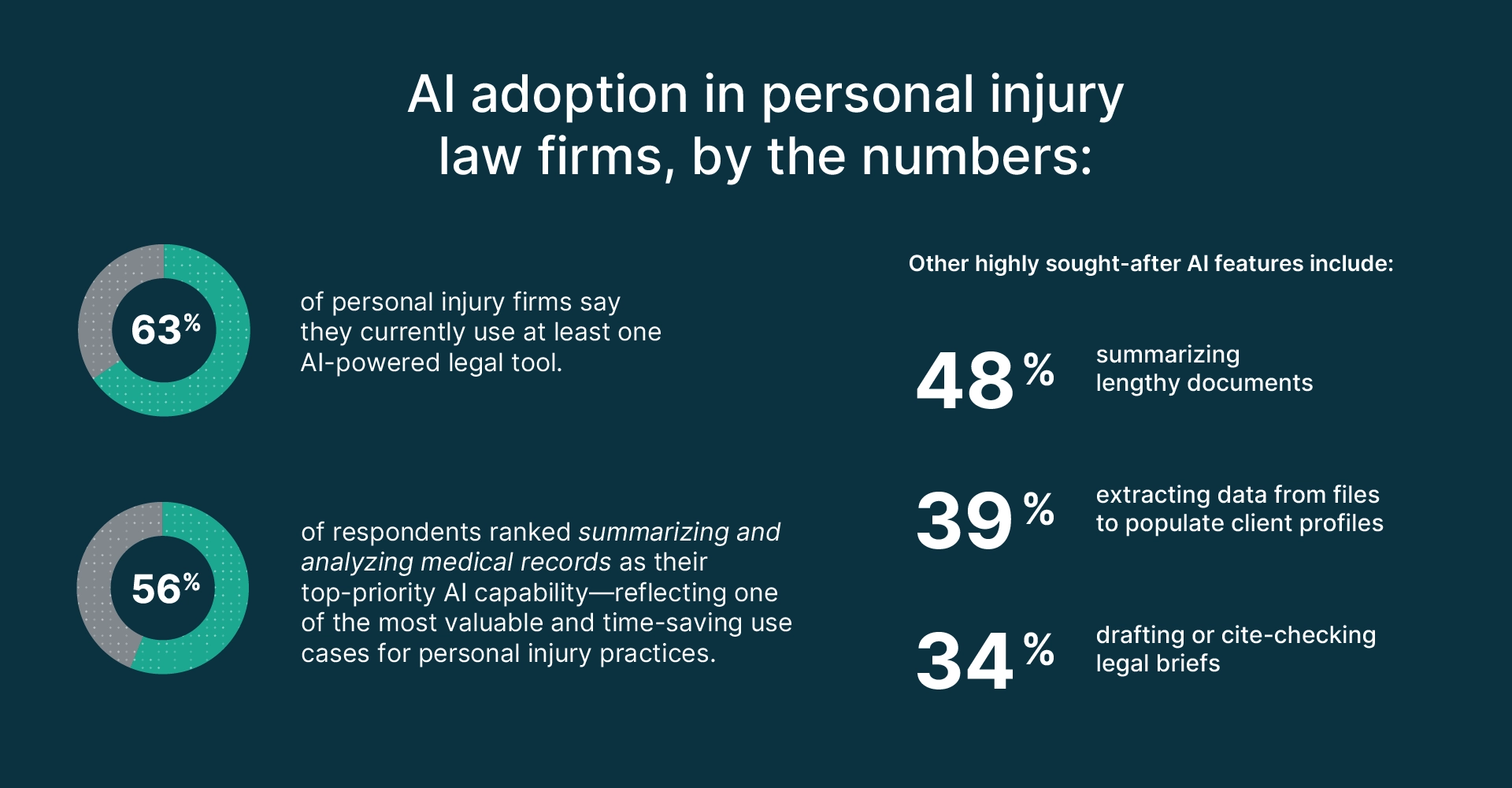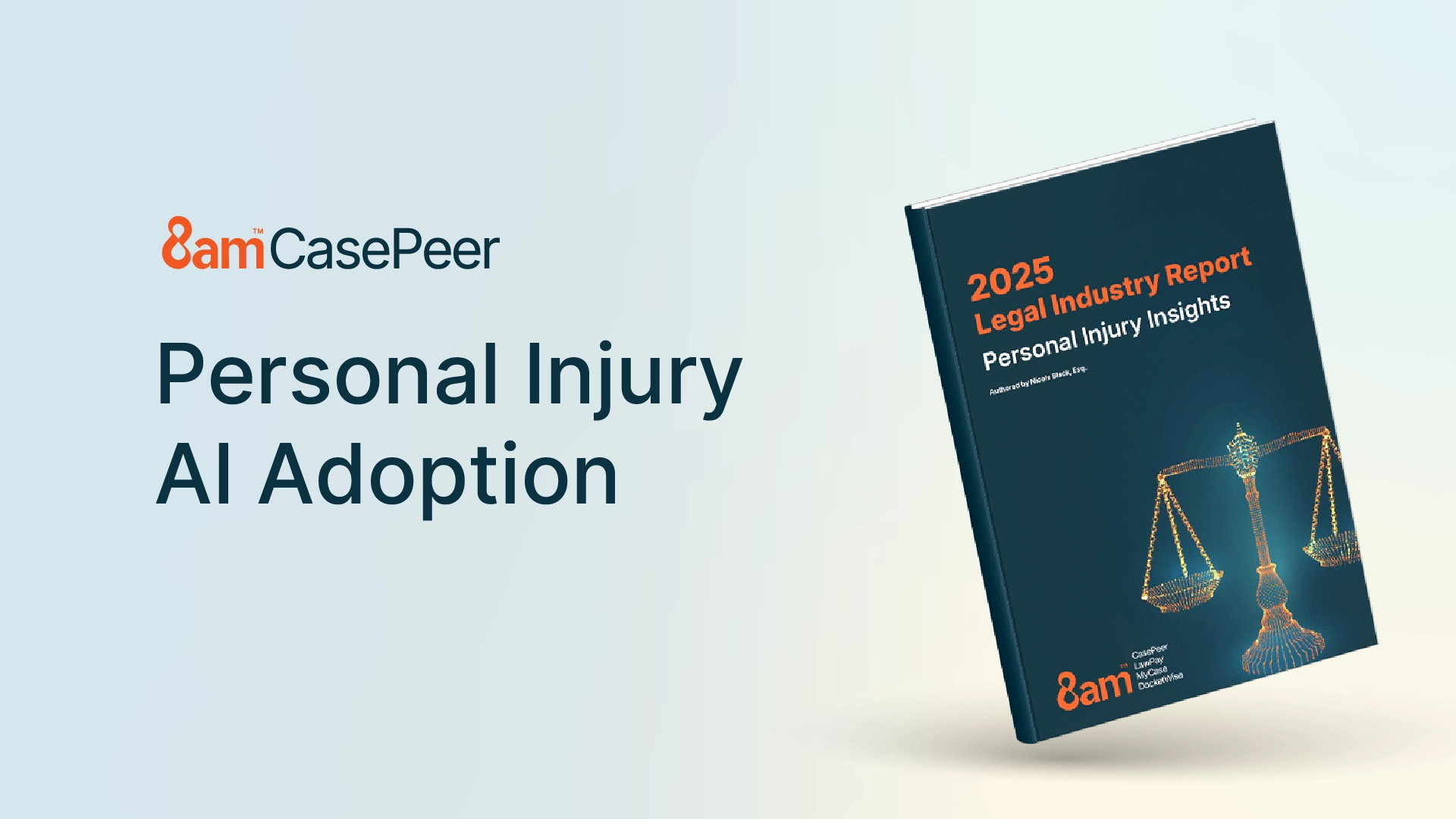The legal landscape is constantly evolving, and the rise of artificial intelligence (AI) is transforming the way personal injury lawyers work. New legal AI tools are emerging at an accelerated pace, offering a range of benefits that can streamline workflows, enhance efficiency, and empower lawyers to focus on what matters most—achieving optimal outcomes for their clients.
In this article, we will explore the most impactful AI adoption strategies for personal injury lawyers, outline practical steps for their integration, and address potential challenges of using AI at your firm.
What are AI tools for lawyers?
Personal injury AI tools are legal technologies built to support personal injury law firms' fast-paced, detail-intensive workflows. These tools use artificial intelligence to handle repetitive tasks like medical record review, demand letter drafting, and lead qualification—tasks that often consume valuable time and staff resources.
AI tools tailored for personal injury law can process large volumes of data, identify key details, and generate insights or documents that help attorneys move cases forward faster. Firms that use these tools gain more time to focus on case strategy, client communication, and securing the best possible outcomes.
Understanding personal injury AI adoption trends
AI technology continues to reshape how personal injury law firms operate—from intake to litigation. The recently published 2025 Legal Injury Report: Personal Injury Insights reveals that adoption is accelerating across firms of all sizes, with early adopters seeing strong efficiency gains, especially in intake automation, document generation, and communication.
Larger firms aren’t the only ones embracing change. The report shows a clear trend toward affordable AI for small personal injury firms, with solo practitioners leveraging intuitive tools to reduce overhead and scale their operations.
AI adoption in personal injury law firms, by the numbers:
63% of personal injury firms say they currently use at least one AI-powered legal tool.
56% of respondents ranked summarizing and analyzing medical records as their top-priority AI capability—reflecting one of the most valuable and time-saving use cases for personal injury practices.
Other highly sought-after AI features include summarizing lengthy documents (48%), extracting data from files to populate client profiles (39%), and drafting or cite-checking legal briefs (34%).
This growing trend highlights the role of AI in transforming the industry—especially when law firms strategically adopt tools that address their most time-consuming tasks.

Results of AI adoption from the report:
47% of small PI firms (under 10 attorneys) say AI improved efficiency in less than 6 months.
74% of PI firms using AI say it has improved internal workflows and staff productivity.
This data confirms how AI tech improves law firm productivity in injury cases, especially for solo practitioners and small teams.
How does AI help personal injury lawyers?
AI is proving to be a game-changer for legal professionals' productivity. Here are three ways AI for personal injury lawyers is revolutionizing the industry:
1. Save time reviewing and editing documents
AI-powered tools can significantly reduce the time spent reviewing and editing legal documents. By automating tasks such as proofreading, formatting, and error checking, personal injury lawyers can focus on more strategic aspects of their cases. Additionally, AI can help identify potential inconsistencies and omissions, improving the overall quality and accuracy of legal documents.
According to the 2025 Legal Injury Report: Personal Injury Insights:
58% of firms using AI tools reported saving at least one hour per attorney per day on tasks like document review, editing, and legal writing.
Among firms using AI for demand letters and medical chronologies, 73% said they complete these documents faster and with fewer revisions.
2. Get more time to invest in high-value legal work
By automating routine tasks, AI empowers lawyers to focus on high-value activities such as case strategy and client interaction. For example, AI personal injury law tools can generate accurate and comprehensive medical chronologies and demand letters, saving lawyers countless hours. This increased focus on core competencies can lead to stronger case outcomes and greater productivity for your firm.
3. Improve the client experience
AI can enhance the client experience in several ways. For example, AI-powered chatbots can provide immediate answers to client inquiries, improving accessibility and responsiveness. Additionally, AI can streamline communication and simple case updates, keeping clients informed throughout the legal process without pulling lawyers away from more complex tasks.
Finally, to illustrate the impact of AI on law firms, consider these statistics from the 2024 Legal Industry Trends Report:
75% of firms use AI to increase their overall productivity, enabling them to handle more caseloads.
51% of firms achieve cost savings and operational efficiency using AI, allowing for more valuable resource allocation.
28% and 18% of firms, respectively, use AI to replace some administrative and legal functions, streamlining processes and reducing manual tasks.
Steps for personal injury firms to Adopt AI Tools
To harness the full potential of AI for personal injury lawyers, a strategic implementation plan is essential. Here are four key steps to guide you through the process:
1. Analyze law firm inefficiencies
The first step is to identify areas within your firm where AI can have the greatest impact. For many personal injury law firms, this often involves tasks related to document creation, review, and management. By pinpointing inefficiencies, you can prioritize AI tools that address your firm's specific needs.
2. Research Legal AI Tools
Once you’ve identified inefficiencies within your firm, the next step is to research AI tools designed to solve those specific challenges. With the rise of AI adoption in personal injury law, the market now offers various tools—from intake assistants and legal writing platforms to document summarization and analytics engines.
Rather than choosing the most popular product, focus on selecting a tool that integrates well with your current workflow, case management system, and team capabilities. Small firms in particular should prioritize affordable AI for small personal injury firms that offer fast time-to-value without a steep learning curve.
Here are some practical steps to guide your research:
Define your goals: Are you looking to streamline intake, draft faster, or analyze cases more effectively?
Evaluate integrations: Look for tools that connect with your existing platforms, like 8am™ CasePeer or 8am MyCase.
Request demos: Most legal AI providers offer guided walkthroughs. Use them to assess ease of use.
Talk to peers: Ask other personal injury attorneys how they’re using AI to streamline litigation or enhance client communication.
Read verified reviews: Look at G2, Capterra, or industry blogs to understand real-world experiences.
3. Implement and Train Team
Once you have selected AI-powered personal injury law tools, it is essential to roll them out effectively. Start by implementing tools in areas that will benefit most from automation. Provide comprehensive training to your team to ensure they understand how to use the new technology and how it fits into their workflows.
4. Monitor, Evaluate, Iterate
The AI landscape is constantly evolving, so it is crucial to continuously monitor the performance of your personal injury law tools and their impact on your firm's operations. Gather feedback from your team to identify areas for improvement and make necessary adjustments. Regular evaluation will help you maximize the benefits of AI and ensure it aligns with your firm's goals.
Top AI use cases for personal injury lawyers
As more firms embrace AI, personal injury lawyers find new ways to streamline operations, reduce bottlenecks, and increase productivity. From intake to litigation, here are some of the top use cases where AI makes a measurable impact:
Client intake: AI tools can dramatically speed up the intake process by automating data collection and routing inquiries. A personal injury intake AI agent can screen potential clients through online forms or chatbots, capture essential case details, and sync them directly to your case management system. This ensures no lead slips through the cracks and reduces administrative back-and-forth.
Lead qualification: For firms handling high inquiry volume, using AI to qualify leads for personal injury helps prioritize the most promising cases. AI can assess factors like liability, injury severity, and coverage details to flag high-value leads and move them into the pipeline faster. This gives attorneys more time to focus on building strong cases instead of manually reviewing every inquiry.
Legal writing: Drafting legal documents—whether internal memos or formal demand letters—takes time and precision. AI-powered writing assistants like CasePeer IQ and Practice AI help refine tone, grammar, and structure, while also speeding up document creation. These tools allow teams to spend less time editing and more time practicing law.
Medical chronologies: Summarizing medical records is one of the most time-consuming aspects of personal injury work. AI tools like Foundation AI extract treatment dates, provider notes, diagnoses, and key events to generate organized, readable chronologies. This saves hours of manual work and helps attorneys spot case-critical details faster.
Demand letters: AI excels at pattern recognition and natural language generation, making it ideal for drafting structured documents like demand letters. Attorneys can input relevant facts, damages, and timelines, and receive a detailed first draft within minutes. With tools like CasePeer IQ, teams can generate consistent, persuasive letters that reduce prep time and accelerate settlement negotiations.
These use cases reflect the growing demand for AI tech improving law firm productivity in injury cases, particularly for firms looking to scale efficiently without sacrificing quality.
AI tools personal injury lawyers should consider
The legal tech landscape is rapidly evolving, and personal injury lawyers now have access to a range of AI-powered tools explicitly built to solve their unique challenges. From document automation to client intake and litigation prep, here’s a curated list of tools worth considering based on your firm’s needs and goals.
CasePeer IQ
Built directly into the CasePeer platform, CasePeer IQ offers a suite of AI-powered features that help personal injury firms streamline communication and accelerate casework.
Key strengths:
AI-powered text editing for legal documents, client letters, and notes
Smart grammar, tone, and clarity enhancements
Document summarization to extract critical information from lengthy files
Tailored to the workflows of personal injury firms
Foundation AI
Foundation AI helps attorneys and staff save hours on record review by automatically extracting key facts and medical details from PDF files and treatment records.
Key strengths:
AI-driven medical record summarization
Auto-extraction of dates, diagnoses, providers, and procedures
Integrated with CasePeer for seamless case management
Practice AI
Practice AI is a writing assistant that helps personal injury lawyers refine and accelerate their written communication, including demand letters and client correspondence.
Key strengths:
Built-in tone suggestions and content enhancement tools
Seamless integration with CasePeer
Ideal for smaller teams looking to boost content quality quickly
Novo AI
Novo AI enables firms to automate and intelligently manage the earliest stages of the client journey—from initial contact through case qualification.
Key strengths:
Automates intake forms, follow-ups, and lead routing
Uses natural language AI to assess case criteria
Easily integrates with CasePeer to keep data organized
Legalyze AI
Legalyze AI helps litigators review documents, build arguments, and identify relevant case patterns faster.
Key strengths:
Context-aware legal document analysis
Highlights key arguments, facts, and legal references
Reduces prep time for motions, briefs, and case strategy
Lex Machina
Lex Machina offers advanced litigation analytics to help lawyers make data-driven decisions. The platform provides insights into judge behavior, court trends, and opposing counsel performance.
Key strengths:
AI-powered predictions based on millions of federal and state cases
Profiles of judges and opposing attorneys
Strategy-enhancing insights at every stage of litigation
Key strengths:
Fast and accurate legal research through AI query support
Covers legal data from over 100 countries
Streamlines legal research into a single searchable platform
Ethical risks and challenges of AI in personal injury law
As AI becomes more embedded in legal workflows, it brings not only efficiency but also ethical and operational risks. Personal injury lawyers must understand and mitigate these concerns to protect client interests, uphold professional standards, and comply with evolving regulations. The ethical risks of AI in personal injury law should be top-of-mind for any firm considering AI adoption.
Top challenges
Accuracy and oversight: AI-generated writing must be reviewed by licensed attorneys to ensure factual and legal accuracy. Errors in AI-generated documents can lead to malpractice risks.
Workflow disruption: Poorly implemented AI tools may confuse staff, disrupt workflows, or lead to inconsistent client service.
Cost vs. value: Some firms may struggle to evaluate the ROI of AI tools, especially when balancing costs with long-term productivity gains.
Core ethical considerations
Client confidentiality: Uploading case data to AI platforms—especially cloud-based ones—requires strict data security protocols and client consent where necessary.
Bias and fairness: AI models can reflect biases in their training data. Personal injury firms should understand how tools are trained and regularly audit outputs.
Disclosure and transparency: Some jurisdictions may require lawyers to disclose when AI has been used to draft legal content. Transparency helps maintain trust and ethical integrity.
Understanding these risks and proactively addressing them is critical to using AI responsibly in a personal injury practice.
Learn more about CasePeer AI text editing
CasePeer IQ offers intuitive AI tools built directly into your case management platform. From drafting legal memos to editing demand letters, the text editing feature helps your team move faster without sacrificing quality. It’s designed specifically for personal injury law—so you can streamline your workflow with confidence. Explore CasePeer IQ today.
Personal injury AI FAQs
About the author

CASEpeer Team
